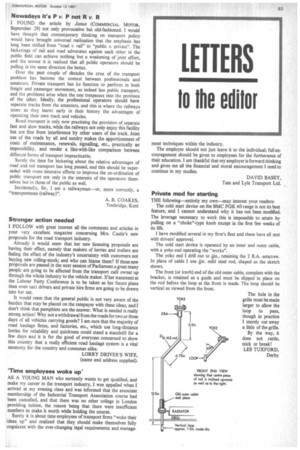Nowadays it's P v. P not R v. R I
Page 65

If you've noticed an error in this article please click here to report it so we can fix it.
FOUND the article by Janus (COMMERCIAL MOTOR, September 29) not only provocative but old-fashioned. I would have thought that contemporary thinking on transport policy would have brought universal realization that the emphasis has long been shifted from "road v. rail" to "public v. private". The bickcrings of rail and road advocates against each other in the public field can achieve nothing but a weakening of joint effort, and the sooner it is realized that all public operators should be pulling in the same direction the better.
Over the past couple of decades the crux of the transport problem has become the contest between professionals and amateurs. Private transport has its function to perform in both freight and passenger movement, as indeed has public transport, and the problems arise when the one trespasses into the province of the other. Ideally, the professional operators should have separate tracks from the amateurs, and this is where the railways score as they learnt early in their history the advantages of operating their own track and vehicles.
Road transport is only now practising the provision of separate fast and slow tracks, while the railways not only enjoy this facility but are free from interference by other users of the track. Joint use of the roads by all and sundry makes the apportionment of costs of maintenance, renewals, signalling, etc., practically an impossibility, and render a like-with-like comparison between different forms of transport impracticable.
Surely the time for bickering about the relative advantages of road and rail transport has long passed, and this should be superseded with more intensive efforts to improve the co-ordination of public transport not only in the interests of the operators themselves but in those of the public as well.
Incidentally, Sir, I am a railwayman—or, more correctly, a "transportman (railway)".
A. R. COAKES, Tonbridge, Kent


































































































































